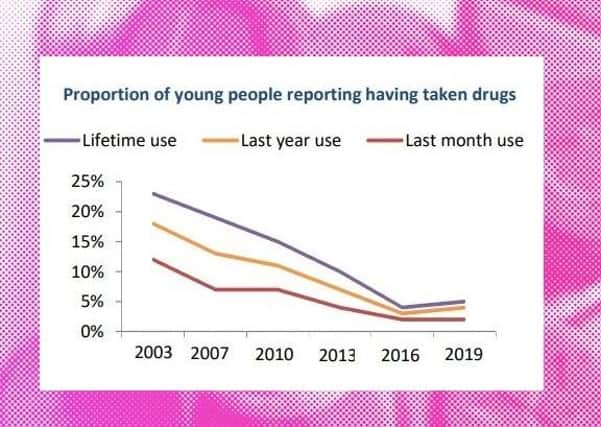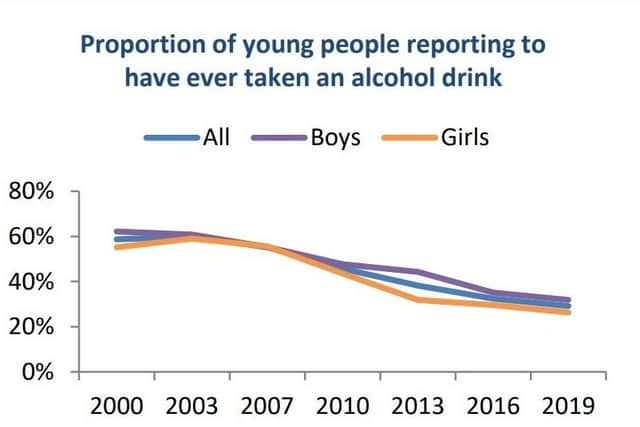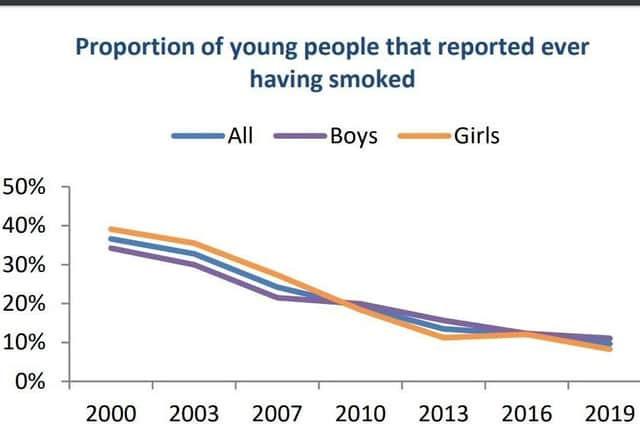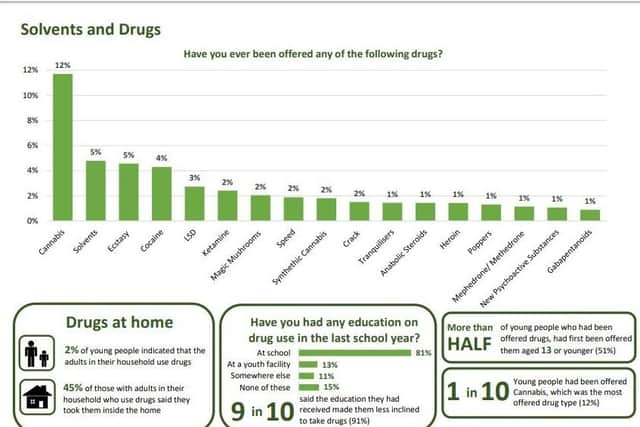Colossal collapse in drug-taking among NI children – plus drinking and smoking – says fresh survey


The figures were released today by the Department of Health and show an unmistakable long-term downward trend in all three categories (extra graphs like the kind above can be found in the web version of this story).
Health chiefs have been monitoring the statistics since about the turn of the millennium.
Advertisement
Hide AdAdvertisement
Hide AdThis latest survey ran between September 2019 and February 2020, and in total 8,118 children completed it.


They were all aged 11 to 16.
~ When it comes to tobacco, the latest figures showed that 10% of children surveyed reported ever having smoked (with 4% indicating that they currently smoked).
~ In the year 2000, 37% of children said they had smoked at least once (with 15% being current smokers).
~ Boys (11%) were more likely to report ever having smoked than girls (8%).
Advertisement
Hide AdAdvertisement
Hide Ad

~ 32% of young people indicate that adults in their household smoke.
~ Looking at alcohol use, the new survey results showed that 29% of the children polled had tried alcohol, compared with 59% in 2000.
~ Again, boys were more likely to report having taken a drink (32%) than girls (26%)
~ Of those who had tried alcohol, 25% vomited, 23% got in trouble with their parents or other family member, 22% had “done something they later regretted”, 17% had an argument , 11% had a fight and 8% posted/something on social media that they later wished they hadn’t.
Advertisement
Hide AdAdvertisement
Hide Ad

~ On the subject of drugs, this is where the most remarkable cultural change has occurred.
~ In all, 5% of respondents said they had tried them.
~ But back in 2003, which is as far back as the drug figures go, 23% of respondents said they had tried drugs –
~ Boys (6%) were far more likely to report having used drugs than girls (3%).
~ By far the most common drug to be offered to young people was cannabis (12% of those surveyed said they had been offered it).
Advertisement
Hide AdAdvertisement
Hide Ad~ This was followed by solvents (5% had been offered it), ecstasy (5%), cocaine (4%), and LSD (3%).
~ When it comes to the most extreme drugs, 2% of respondents said they had been offered crack cocaine, and 1% said they had been offered heroin.
The survey was called the Young Persons Behaviour & Attitudes Survey (or YPBAS).
Gerry McElwee, head of cancer prevention at Cancer Focus NI, hailed the newly-released figures.
Advertisement
Hide AdAdvertisement
Hide Ad“Prevention and stop smoking services have always been key elements of Cancer Focus NI’s strategy,” he said.
“Our prevention and stop smoking strategies with young people will eventually achieve Cancer Focus NI’s vision of a tobacco free society.”
However, the survey also showed that 18% of young people got lifts with adults who smoked in the car, and the charity called for the government to enact a law restricting smoking in cars with children.
READ MORE FROM THIS REPORTER:
Advertisement
Hide AdAdvertisement
Hide AdCLICK HERE: Jay Donnelly controversy: Glentoran ‘sold nine season tickets in an hour and refunded just one‘
——— ———
A message from the Editor:
Thank you for reading this story on our website. While I have your attention, I also have an important request to make of you.
Advertisement
Hide AdAdvertisement
Hide AdWith the coronavirus lockdown having a major impact on many of our advertisers — and consequently the revenue we receive — we are more reliant than ever on you taking out a digital subscription.
Subscribe to newsletter.co.uk and enjoy unlimited access to the best Northern Ireland and UK news and information online and on our app. With a digital subscription, you can read more than 5 articles, see fewer ads, enjoy faster load times, and get access to exclusive newsletters and content. Visit https://www.newsletter.co.uk/subscriptions now to sign up.
Our journalism costs money and we rely on advertising, print and digital revenues to help to support them. By supporting us, we are able to support you in providing trusted, fact-checked content for this website.
Alistair Bushe
Editor